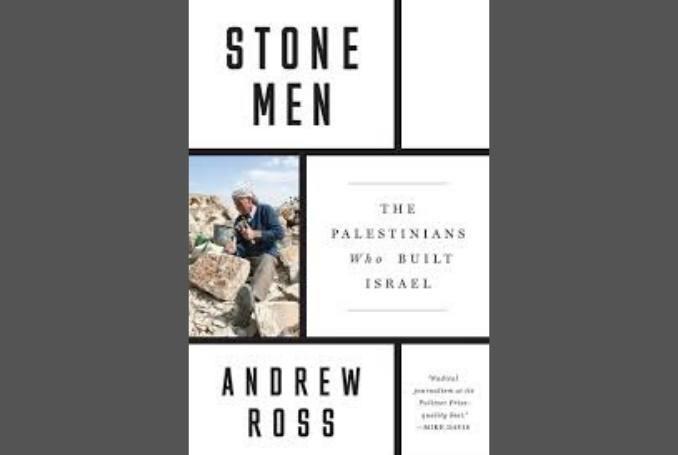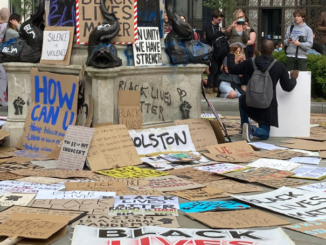
There is a memorable passage from satirist Evelyn Waugh’s perhaps purposively unremembered political masterpiece “Black Mischief” (1932), in which Basil Seal, the chief Anglo architect of a modernization program in the fictional African island nation of Azania, passes a stark sentence on the democratically bereft principals of political modernity:
“You know,” he added reflectively, “we’ve got a much easier job now than we should have had fifty years ago. If we’d had to modernize a country then it would have meant constitutional monarchy, bicameral legislature, proportional representation, women’s suffrage, independent judicature, freedom of the press, referendums…”
“What is all that? ” asked the Emperor.
“Just a few ideas that have ceased to be modern.”
If this sounds like an incomplete list of the supposedly democratic state of Israel’s undemocratic practices in its modern occupation of Palestine, it might be because it’s taken until Andrew Ross’s “Stone Men: The Palestinians Who Built Israel” to sufficiently amend it.
Focusing on the nearly century-long, under-reported exploitation of Palestinian labor in the West Bank’s stone industry, a sweat and bloodsoaked epoch that Ross argues more than justifies the recognition of full Palestinian civil rights in a single-state framework, Ross traces with scrupulous detail how the Palestinians, since the pre-1948 days of the British Mandate, have had a “principal share in building the infrastructure” of Israel and a “decisive hand in most of the fixed assets on the land between the River Jordan and the Mediterranean coast.”
In recompense for their building:
“roads, railways, ports, telecom lines, an airport, and other public works; the ‘first
Hebrew city’ of Tel Aviv; all the Arab towns and cities that were taken under
Jewish control after the Nakba; the ever-expanding metropolis of ‘unified’ and
Greater Jerusalem; and the red-tiled hilltop settlements on the West Bank along
with their grid of bypass roads, barrier walls, super-highways, and other security
structures…”
The Israeli state has, cue Waugh, denied Palestinians “access to collective bargaining and legal avenues for redress and income deprivation from the policies of collective punishment and economic underdevelopment,” withheld the social insurance benefits of Palestinian workers from 1967 to the present, and blocked any pathway for Palestinian civil rights or inclusion within the Israeli state they’ve helped to build.
Not to mention the lack of freedom of the press (Palestinian news stations are frequently raided and pilfered), independent judicature (the IDF adjudicates in Palestine based off Israeli law, and often short of that, martial law), etc. etc.. Since the publication of “Black Mischief” in 1932, thanks to Israel the list of democratic negations in political modernism has nearly doubled (the only avenue of political progress it could be safely said that Israel is in any way at the forefront of).
But “Stone Men” doesn’t demarcate its investigations of corruption and exploitation based on the Green Line, the last legal border of Israel arranged in 1967 (incidentally the last year Israel ever recognized its legal demarcation). Ross makes critical forays into the Palestinians elites who skim money off the top of the exploitation racket – a venture most advocates for Palestine shy away from.
Bringing his focus to Israeli-Palestinian joint-ventures like the new Palestinian city of Rawabi, a source of much contempt and suspicion amongst Palestinians who live nearby and had their farmlands seized for the construction of Rawabi through eminent domain by the Palestinian Authority (PA), Ross parses through the baroque corruption of the Palestinian elite.
With the Oslo Accords officially establishing neoliberal economics in Palestine by dangling a debt-based consumerist carrot in front of the PA, supposedly plodding along a loan-burdened path toward peace and sovereignty, cities like Rawabi are built and financed entirely through private contracts with Israeli businesses instead of Palestinian. And to procure an apartment, one has to qualify for a long-term mortgage, loans Palestinians can’t exactly afford to shoulder with 25% of minimum wage earners living below the poverty line.
From 2009 to 2014 “household debt increased sixfold,” and between 2007 to 2017, Palestine’s national debt grew by 470%, with only 7.9% of loans held by Palestinians “being invested in a productive sector of the economy.” With lordly debt-holding profiteers like the Palestinian Masri family who spurred the creation of Rawabi and the Palestinian politicians who greenlight the operations, the Occupation has not only become a lucrative venture for Israel, but for Palestinian elites and the PA Fateh party.
Quoting a Palestinian interviewee intimate with the racket,
“’The Western donor community, Israel, Fateh, and Jordan each reap dividends in their currency of preference: power, money, security, and logistical support,’ and the whole enterprise ‘relies upon the manipulation and appropriation of the dreams and hopes of an oppressed people for freedom, peace, and justice.”
As an example, in 2004 when Egypt offered 360,000 tons of cement at a discounted price to help rebuild housing in Gaza after the highly destructive aftermath of the al-Aqsa intifada, the PA sold most of the cement to Israel by way of an export license procured by the Ministry of National Economy (headed incidentally by a Masri family member). The cement was instead used for the extension of the Separation Wall, which desperate Palestinians, of course, had little option but to sign on to build.
It is corruption like this and the unilateral conflicted interests shared between Israel and the PA against Palestinian citizens that lead Gatestone Institute, an anti-Muslim think tank (ponder those four joint words), to [defend Palestinian President Mahmoud Abbas] while simultaneously spewing intentionally false and misleading Islamaphobic news items about Palestine and Arab immigration into the United States.
With debt and loan payments at the forefront of the average Palestinian’s mind and a creditocracy for a government, “solidarity is eroding” argues Ross.
“Under such circumstances, the future is no longer measured as an open pathway to national liberation, but as a countdown to paying off the loan. For the supposed economic pacification – credit for peace – that threatens to prolong the Occupation.”
With the momentum of the Palestinian Solidarity Movement rallying around a single-state solution for Palestine, and emboldened members of the Knesset calling for annexation of the West Bank with 42% of Israeli citizens in support, Andrew Ross has left a portentous mark on what will be, if it happens, a profound debate for the civil rights of indigenous Palestinians in a single-state, a principal share Palestinians have already built themselves.
– Nicholas V. Barney is an American writer, journalist, and advocate for human rights in Palestine. After the death of a close friend from the West Bank, Nicholas V. Barney has made several trips to Palestine and has spent considerable time living with Palestinian families







